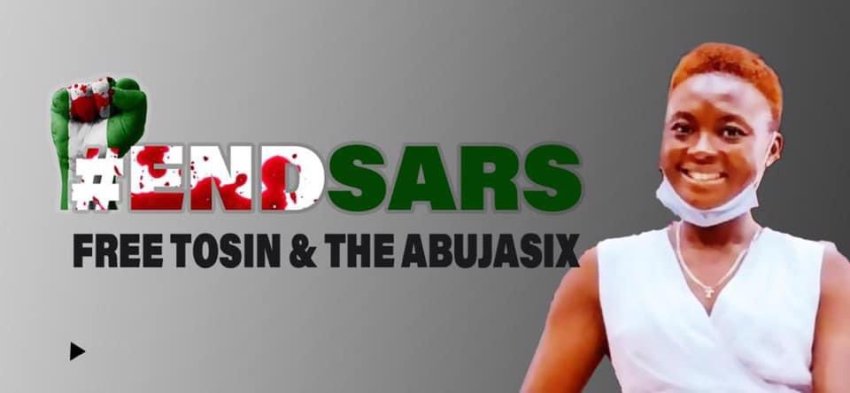
Major General Muhammadu Buhari spoke to Nigeria's 200 million inhabitants on October 22. It was a lacklustre speech with a hidden threat. He did not say a word about the [Lekki] massacre while he had a lot to say about break down of law and order, including concern over the desecration of a king’s palace by “hoodlums”.
The ashes were still hot in at least two dozen public and private buildings torched by irate youth. These included the Nigeria Port Authority, the elite Kings College, dozens of buses at the Bus Rapid Transport terminal, at least six local government councils, the newspaper and television station owned by one of the leaders of the All Progressive Congress and the family house of the Lagos state governor.
Some of the networks within the informal coordination of the formally leaderless movement have called it a day for now.
The feminist coalition, for example, which raised more than $200,000 within two weeks for the campaign (including via bitcoin when the government shut off traditional banking means) had this to say: “The Feminist Coalition condemns every form of violence and believes that no Nigerian life is worth losing to senseless violence.
“We are young Nigerians with hopes, dreams and aspirations for our country. This means we need to stay alive to pursue our dreams to build the future.
“We are merchants of hope. Our priority is always the welfare and safety of the Nigerian youth. Following the President’s address, we hereby encourage all young Nigerians to stay safe, stay home, and observe the mandated curfew in your state.”
Ethnic-nationalist forces have gone into overdrive with circulation of ethnicised narratives, mainly through WhatsApp platforms, contending for the soul of the embers of this moment.
On the other hand, rallies are being planned for the next week by Nigerians in different parts of the world to keep stoked the embers of the movement’s resistance.
The jury is still out on how this particular moment will pan out. But whichever way it goes, the genie is out of the bottle. Nigeria will not be the same again.
In the period leading to the next general elections in 2023, we are likely to witness momentous battles which will draw inspiration from these past few weeks.
Circumstances writ large
The act of pulling out the roots of a social order entails the art of organising. Making history, including organising on the scale we have had with the movement, emerges from circumstances writ large and immediately precedent to the moment, within an overarching global context.
It is not wholly accidental that while there had been several SARS killings before October 3, and whereas there have been protests against a number of these, none comes anywhere near the scale of the 2020 #EndSARS rebellion.
There are several reasons for this. The blogosphere is seen by many as probably one of these, but this does not explain why there has not been any such rebellion since the January 2012 “Occupy Nigeria” revolt, where Twitter was also very much used even if not on this scale.
There are three key reasons which are important to take note of as we enter the near future: First, the global conjuncture, with massive fightbacks across the world from last year. Second, the rise of the #RevolutionNow movement last year which saw google searches in Nigeria for the word “revolution” cross the five million mark on August 5, 2019.
Third is the place of organised labour, in a contradictory sense.
The #EndSARS campaigners were adroit in the use of online platforms to inspire action on the ground and build the coherence of a narrative for these actions despite the inchoate nature of the movement.
The bulk of the left, outside the Coalition for Revolution (CORE), which initiated the #RevolutionNow movement, was caught off guard in this moment. And the liberal forces which played central roles, mainly via the internet and as celebrities on the ground, are likely to cohere around a new party with eyes set more towards the general elections.
A major social force missing in the equation of the movement was organised labour. It had called a general strike for September 28 to protest the increasing cost of living, which it called off unceremoniously at the eleventh hour. But as the impact of job losses and increases in fuel pump prices, electricity tariffs and basic staples hit rank-and-file workers, it might prove ever more difficult for it to keep away from the arena of struggle.
A general strike aligned with the massive level of rebellion which the #EndSARS movement has been could very well see the regime crumble before the general elections. But in the immediate instance, it must be made to pay for the crime of no fewer than 56 people killed in cold blood during the revolt.
Trade unions, civil society organisations and governments must call for justice for those who have been murdered for doing no more than exercising the constitutional right to dissent. Bloodbath must never be the answer to peaceful revolts in Nigeria or anywhere in the world.
[Abridged from Global Labour Column. Baba Aye is a trade unionist and co-convener of CORE.]